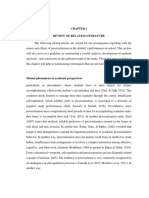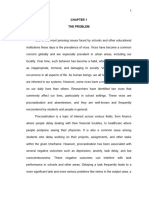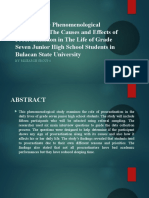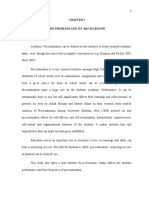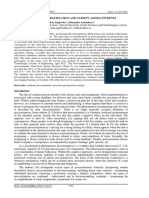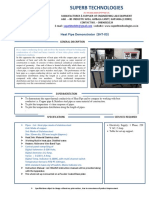Procrastination
Procrastination
Uploaded by
poadCopyright:
Available Formats
Procrastination
Procrastination
Uploaded by
poadCopyright
Available Formats
Share this document
Did you find this document useful?
Is this content inappropriate?
Copyright:
Available Formats
Procrastination
Procrastination
Uploaded by
poadCopyright:
Available Formats
IMPACT OF PROCRASTINATION TO ACADEMIC PERFORMANCES 1
Chapter 1
THE PROBLEM AND ITS BACKGROUND
Introduction
Procrastination is a prevalent and pernicious form of self-regulatory failure that is not
entirely understood. Hence, the relevant conceptual, theoretical, and empirical work is
reviewed, drawing upon correlational, experimental, and qualitative findings. A meta-
analysis of procrastination's possible causes and effects, based on 691 correlations,
reveals that neuroticism, rebelliousness, and sensation seeking show only a weak
connection. Strong and consistent predictors of procrastination were task aversiveness,
task delay, self-efficacy, and impulsiveness, as well as conscientiousness and its facets of
self-control, distractibility, organization, and achievement motivation. These effects
prove consistent with temporal motivation theory, an integrative hybrid of expectancy
theory and hyperbolic discounting. Continued research into procrastination should not be
delayed, especially because its prevalence appears to be growing (Steel, 2007).
Procrastination is the practice of carrying out less urgent tasks in preference to more
urgent ones, or doing more pleasurable things in place of less pleasurable ones, and thus
putting off impending tasks to a later time.
|Nowadays the senior high school students are given several school requirements
which they need to accomplish in a short period of time. Most of them can submit their
requirements before the deadline, but some fail to submit their requirements on time due
to internal factors. This in return, affects their academic performance negatively.
ST. AUGUSTINE ACADEMY OF PAMPANGA
IMPACT OF PROCRASTINATION TO ACADEMIC PERFORMANCES 2
In school, students also fight an unvarying battle between procrastination and
motivation. Students who are chronic procrastinators may be at risk of underachieving
academically. And it became a hindrance to those students who get demotivated and off-
track whenever there is an unpleasant happening in school. A phenomenon that can affect
all areas of a person’s life.
Unfortunately, this procrastination can have a serious impact on a number of life
areas, including a person's mental health. In a 2007 study, researchers found that at the
beginning of the semester, students who were procrastinators reported less illness and
lower stress levels than non-procrastinators. This changed dramatically by the end of the
term when procrastinators reported higher levels of stress and illness. Not only can
procrastination have a negative impact on your health; it can also harm your social
relationships. By putting things off, you are placing a burden on the people around you. If
you habitually turn in projects late or dawdle until the last minute, the people who depend
on you such as your friends, family, co-workers, and fellow students can become
resentful (Cherry, 2019).
As stated by Lakshminarayan et al., (2013) the term “procrastination” has been
defined as “the act of needlessly delaying tasks to the point of experiencing subjective
discomfort or putting off that which is necessary to reach some goal.” Procrastination is a
current topic of interest across multiple fields, from finance (as people defer dealing with
their financial troubles) to health care (as people delay seeing their physicians).
Unfortunately, it also has been associated with numerous negative outcomes including
neuroticism, depression, anxiety, impulsivity, aversiveness, task delay, and low self-
efficacy and conscientiousness, in addition to its facets of self-control, distractibility,
ST. AUGUSTINE ACADEMY OF PAMPANGA
IMPACT OF PROCRASTINATION TO ACADEMIC PERFORMANCES 3
organization, achievement motivation, and poor academic performance. Hence, such
negative outcomes are believed to interfere with task performance. Postponing a task
frequently leads to a larger task and more serious problems like stress, a sense of guilt
and crisis, severe loss of personal productivity, and social disapproval for not meeting
responsibilities or commitments. When these feelings are combined, they may promote
further delays or procrastination. For example, when people postpone a visit to the dentist
or the reading assignments for a college course, they often have more severe dental
problems or an all-night cramming session later on, respectively. It is regarded as normal
for people to procrastinate to some degree, but such procrastination becomes problematic
when it impedes normal functioning.
Laeus, (2015) explained that procrastination is the avoidance of doing a task that
needs to be accomplished. He further states that procrastinate is the process of doing
more pleasurable things in place of less pleasurable ones or carrying out less urgent tasks
instead of more urgent ones, thus putting off impending tasks to a later time. However,
the procrastination serves as a major problem that contributes to poor reading and the
inability of the students to read and understanding in the post-primary education in
Nigeria today. Moreover, it affects the reading culture among the students only a few
students are reading and perform well, even this contributes the eagerness of the students
who involve in examinations malpractices both internal and external examinations. For
instance, in 2014 and 2015 (WAEC) canceled the results of more than four zones in
Nigeria. (South- West, South-South, South-east and North) of senior secondary school
certificate examination), while in other zones many students could not pass English
language and Mathematics.
ST. AUGUSTINE ACADEMY OF PAMPANGA
IMPACT OF PROCRASTINATION TO ACADEMIC PERFORMANCES 4
Dilmac, (2009) stated that the procrastination appears to be a troubling phenomenon,
people most strongly characterized it as being bad, harmful, and foolish. Justifying this
viewpoint, several studies have linked it to individual performance, with the
procrastinator performing more poorly overall, and to individual well-being, with the
procrastinator being more miserable in the long term. At larger levels of analysis,
Procrastination has been linked to several organizational and societal issues.
Behavioral procrastination is a self-sabotage strategy that allows people to shift blame
and avoid action, for example: a student may do poorly in an exam and use
procrastination as an excuse. “Ferrari also thinks that procrastinators suffer from low
esteem and self-doubt and worry about how other people judge their abilities. Prolonged
procrastination and failure to perform adequately creates a cycle of self-defeating
behavior, which results in a downward spiral of self-esteem. Self-inflicted degradation
and shame of this kind often translates into stress and (mental) health problems at some
point. (Ojo, 2019)
As stated by Cherry, (2019) this procrastination can have a serious impact on a
number of life areas, including a person's mental health. In a 2007 study, researchers
found that at the beginning of the semester, students who were procrastinators reported
less illness and lower stress levels than non-procrastinators. This changed dramatically by
the end of the term when procrastinators reported higher levels of stress and illness. Not
only can procrastination have a negative impact on your health; it can also harm your
social relationships. By putting things off, you are placing a burden on the people around
you. If you habitually turn in projects late or dawdle until the last minute, the people who
ST. AUGUSTINE ACADEMY OF PAMPANGA
IMPACT OF PROCRASTINATION TO ACADEMIC PERFORMANCES 5
depend on you such as your friends, family, co-workers, and fellow students can become
resentful.
Ackerman and Gross, (2005) studied 198 undergraduate college students from two
large public universities in the southwestern United States. The researchers administered
5 a self-report measure where participants were asked about their own overall proclivity
to procrastinate, an assignment-related measure that included questions about task
importance (norms, deadlines, rewards, and interdependence, task appeal (interest level
and skill variety), and task difficulty (knowledge required, scope of task, and clarity), and
a behavioral measure of procrastination which measured actual procrastination behavior
on a previous class assignment. They found that participants who were low on
procrastination reported more interest in the assignments compared to those who
procrastinated more. This supports the idea that interest is an important motivator, and
that if instructors were to develop and use assignments perceived by students as being
interesting, procrastination could possibly decrease. Additionally, tasks that require
students to use a greater variety of skills to complete an assignment may also be
perceived as being interesting, which may motivate students to start earlier. Therefore,
while it may be difficult to create assignments that appeal to all students, if the
assignment allows the use of a variety of skills, the perceived interest is thought to be
greater. Clarity of instructions was also a factor that was found to be significant. The
researchers also found that unambiguous instructions that enabled students to understand
exactly what was expected and required to succeed on an assignment could reduce the
fear of starting. Procrastination was also found to decrease when there were rewards or
incentives for starting early.
ST. AUGUSTINE ACADEMY OF PAMPANGA
IMPACT OF PROCRASTINATION TO ACADEMIC PERFORMANCES 6
According to Kim and Seo, (2015) stated that relationship between procrastination
and academic performance is influenced by nature of performance indicator, the choices
of procrastination measures, and demographic profile of study sample. They emphasized
that (a) self-reported procrastination was strongly associated with academic performance
more than externally assessed procrastination, (b) procrastination is strongly related to
externally assessed performance more than self-report performance, (c) procrastination is
strongly correlated with academic performance among younger people more than older
people, and procrastination is negatively related to performance in western and
individualistic society
This quantitative study aims to know how this problem affects the academic
performances of the Selected Senior High School respondents at St. Augustine Academy
of Pampanga. The findings of this study will provide the school management useful
information on how procrastination affect the student’s academic performances. All
information are useful in such ways in planning to spread awareness on how importance
of knowledge on the said matter.
Conceptual Framework
According to Simpson and Pychyl, (2009) stated that, “procrastination may be
defined as a way to avoid or escape from undesirable tasks. The procrastinator usually
justifies his action by saying that "This is a boring assignment," or "I will do it later". In
another definition, the procrastination has been described as an intentional, unreasonable
postponement of the taken decisions, being unaware of the fact that this will bring about
certain negative consequences”. Procrastination is a widespread problem related to self-
ST. AUGUSTINE ACADEMY OF PAMPANGA
IMPACT OF PROCRASTINATION TO ACADEMIC PERFORMANCES 7
regulation, which is realized as deferral of the beginning and completing the important,
necessary assignments. Procrastination may produce important negative consequences
such as anxiety and depression, regarding the personality. (Sirois, 2007)
Students nowadays gives priority to the technological aspect of the era especially in
the context of social media. Sometimes, it is the students’ way of motivation and as a
reliable resource. Procrastination happens when students lose focus where the projects
must done earlier before the submissions. It is a feeling of need or urgence on how and
when to finish a task in a certain period of time
According to some researches, student learners’ motivation to study or acquire a new
set of skills can change within a short span of time or with some barriers along the way.
Because of these, those students who are unmotivated need assistance from other people,
particularly by offering them some advantages and rewards for achieving the goal. Below
are some factors that affect student motivation.
Self-efficacy is one of the key to avoid procrastination. It is similar to self-discipline
as well as time management. No matter how many the tasks given, it will produce a
disciplined student to be more passionate in doing projects with quality. Self-efficacy
refers to an individual’s belief on one’s capacity to produce a desirable outcome. (Coon
& Mitterer, 2010). It carries the effect of motivating a person to engage in a particular
activity or behavior. Generally, higher sense of self-efficacy might able to motivate an
individual to exert greater amount of effort and persistence when encounter with
obstacles. Conversely, the lower the perceived self-efficacy is, the higher the tendency to
procrastinate. It might lead to emergence of negative thought in a person mind which
ST. AUGUSTINE ACADEMY OF PAMPANGA
IMPACT OF PROCRASTINATION TO ACADEMIC PERFORMANCES 8
obstruct them from perform a task, as they developed a perspective of being not
efficacious. Hence, lack of perceived self-efficacy lends an avoidance behavior towards
tasks or assignment appointed to them. (Delamater & Myers, 2007)
Most studies on procrastination relate to academic procrastination and have been
conducted with college and university student samples. There has been very little
research attention to procrastination at work, and the few studies that have been
conducted do not always address well-being but instead focus on other issues in relation
to procrastination, for example, the types of jobs procrastinators occupy (Nguyen, Steel,
& Ferrari, 2013). This chapter addresses procrastination at work and how it may affect
well-being based upon research focusing on avoidance behavior at work, as will be
explained later. After a brief discussion of how to define procrastination, an overview is
provided of what we may learn from the studies conducted so far. A conceptual
framework is then presented that may guide future research in this area.
Based on the problems stated, the proponents pointed out that an "Anti-
Procrastination Seminar" would be helpful for the senior high school students of St.
Augustine Academy of Pampanga.
The figure involved the statement of the problem. It also involved the process used in
gathering the data of the whole study: survey questionnaires in a form of survey forms
through an unstructured interview. Specifically, the steps of the study are: (a) distribution
of survey forms; (b) collection of survey questionnaires; (c) tallying of survey
questionnaires; and (d) interpreting survey questionnaires. The output shown the desired
outcome of the whole study.
ST. AUGUSTINE ACADEMY OF PAMPANGA
IMPACT OF PROCRASTINATION TO ACADEMIC PERFORMANCES 9
Figure 1. Schematic Diagram of the Study
Input Process Output
Demographic Profile
Selected Grade 11 and
12 of St. Augustine
Academy of Pampanga
Gathering of data
Gender
through:
Anti-Procrastination
Seminar of the Senior
Relationship between High School at St.
Academic Performance Augustine Academy Of
and Procrastination Pampanga
Survey Questionnaires
Difference between
Academic Performance
and Procrastination
Feedback
ST. AUGUSTINE ACADEMY OF PAMPANGA
IMPACT OF PROCRASTINATION TO ACADEMIC PERFORMANCES 10
Statement of the Problem
The main objective of the researcher of this study is to determine the impact of
procrastination of selected Senior High School students on their academic performances
at St. Augustine Academy of Pampanga school year 2019-20120.
1) How may the respondents demographic profile be describe in terms of:
1.1 Gender; and
1.2 Age?
2) How may the respondents procrastination be describe in terms of:
2.1 Study habits;
2.2 School works; and
2.3 Decision making?
3) How may the respondents’ academic performance be measured in terms of
general average?
4) Is there a significant relationship between procrastination and academic
performance?
ST. AUGUSTINE ACADEMY OF PAMPANGA
IMPACT OF PROCRASTINATION TO ACADEMIC PERFORMANCES 11
5) Is there a significant difference between procrastination and academic
performance?
6) Based on the problem, what program may be proposed?
Hypothesis
In the light of the above cited objectives, the following hypothesis has been
formulated by the researcher:
H1: There is a significant relationship between the procrastination and academic
performances of the senior high school respondents at St. Augustine Academy of
Pampanga.
Significance of the Study
This study is done to know the impacts of students that affect their academic
performances and their surrounding environment. It provided ideas and deep information
that may be useful to our society in the future. Thus, the following are the beneficiaries of
the study:
To the Students. . They are the senior high school students and future senior high
school students of the St. Augustine Academy of Pampanga. They are the main concern
of this study that will help them to know the possible reasons of their procrastination and
their impact in studies as well as to the community.
ST. AUGUSTINE ACADEMY OF PAMPANGA
IMPACT OF PROCRASTINATION TO ACADEMIC PERFORMANCES 12
To the Teachers. For the faculty teachers of the senior high school students of St.
Augustine Academy of Pampanga, this will help them to know what and why does their
students attain undesirable grades and having a poor performance in their studies. This
study will help them to consider procrastination as a reason and will be aware of the thing
that they could do to help their students.
To the School. The school is considered as one of the beneficiaries of this study
because we, the researchers, intentions on conducting may enlighten them and it may
help them make a move on reaching their hands to those students who's procrastinating
their schools works or another activities. The school can be an environment of developing
and helping the children grow individually since school is not just about a place for
education, but it is also a home for the students.
To the Society. The society will benefit from this study by making the people
realize on how procrastination can having a huge damage to a student. Furthermore, this
will help them open their minds and hearts to those who are experiencing the problem,
particularly the parents, who are the most influential people to us youth.
To the Guidance Counselor. This relates to the guidance counselor of St. Augustine
Academy of Pampanga, which he or she is the one who makes activities for the good of
students. This will serve them as basis for a possible program for the student’s
procrastination and for the improvement of their academic excellence.
To the Researchers. By conducting a study, the researchers may also benefit from
this study because they can also get a useful information that they can use to their own
ST. AUGUSTINE ACADEMY OF PAMPANGA
IMPACT OF PROCRASTINATION TO ACADEMIC PERFORMANCES 13
study and this may help them to be aware of how to make a research paper more
effectively.
To the Parents. This refers to the parents of the senior high school students of St.
Augustine Academy of Pampanga, they are the guide of these student. And with this,
they will be aware of the procrastination of their children and will help and guide them in
their studies.
To the Future Researchers. This is also to the future researchers; this study will be
beneficial for them because they can use this study as a guide to acquire more knowledge
on conducting a research paper and on how to develop their research capability.
Scope and Delimitation
This study will determined the impact of procrastination to the academic performance
of selected Senior High School students at St. Augustine Academy of Pampanga. There
are some selected senor high school students to be the participants/respondents in the
study. The study used survey questionnaire to gather information and also an observation
to gather some data. On the other hand, the purpose of this study is to know the impact of
procrastination to the Senior High School students at St. Augustine Academy of
Pampanga.
Definition of Terms
For more information and to give ambiguity to the following terms and variables,
they are defined theoretically and effectively.
ST. AUGUSTINE ACADEMY OF PAMPANGA
IMPACT OF PROCRASTINATION TO ACADEMIC PERFORMANCES 14
Procrastination. Procrastination is s behavior that delaying or postponing
something. It refers interactive occussence in which one disregards or delays a timely
attendance to an obligatory assignment or judgment. This action subsequently leads to
some potential unpleasant and undesirable consequences. (Balkis M. & Duru E., 2007)
Academic Performance. Academic performance is the measurement of student
achievement across various academic subjects. Procrastination is an impediment to
students’ academic performance and outcomes and clarifies the need to develop and
study academic interventions for academic procrastination as a means to decrease its
prevalence in academic settings. (Goroshit M., 2018)
Acronyms
SHS- Senior High School
APA- American Psychological Association
SAAP- St. Augustine Academy of Pampanga
ST. AUGUSTINE ACADEMY OF PAMPANGA
IMPACT OF PROCRASTINATION TO ACADEMIC PERFORMANCES 15
Chapter 2
METHOD
This chapter have concisely discussed the research design, participants, and
development of research instruments, administration of the survey questionnaire, and the
statistical tool that was utilized in the analysis and interpretation of the gathering date and
information.
Research Design
The researchers of the study concentrated in a quantitative approach study; it was to
properly gain information and data that are quantifiable, in which it is the basic method in
presenting and examining the information and data. Quantitative approach also allows the
researchers to distant themselves from the participants to ensure an unbiased result to
provide exact data. Wherein the researchers applied two quantitative research designs,
descriptive research design and survey research design in the study.
ST. AUGUSTINE ACADEMY OF PAMPANGA
IMPACT OF PROCRASTINATION TO ACADEMIC PERFORMANCES 16
This study used the descriptive research method which is designed for the
researchers to gather information about present existing conditions needed in the chosen
field of study. This method enables the researchers to interpret the theoretical meaning of
the findings and hypothesis development for further studies.
According to McCombes, (2020) a descriptive research aims to accurately and
systematically describe a population, situation or phenomenon. It can answer what, when,
where, when and how questions, but not why questions. To determine cause and effect,
experimental research is required. A descriptive research design can use a wide variety of
quantitative and qualitative methods to investigate one or more variables. Unlike in
experimental research, the researcher does not control or manipulate any of the variables,
but only observes and measures them.
This just explains that descriptive research only focused on describing things and not
explaining why it happened. With this, it shows that descriptive research is very useful
with this kind of study to determine and identify the impact of having personal issues to
the respondents’ abilities
Correlational research design was also used to measures a relationship between two
variables without the researcher controlling either of them (McCombes, 2020).
According to McCombes, (2020) a correlational research design is a type of field
research, where you gather data about a behaviour or phenomenon in its natural
environment without intervening. This method often involves recording, counting,
describing and categorizing actions and events. Naturalistic observation can include both
ST. AUGUSTINE ACADEMY OF PAMPANGA
IMPACT OF PROCRASTINATION TO ACADEMIC PERFORMANCES 17
qualitative and quantitative elements, but to find correlation, you focus on data that can
be analyzed quantitatively
This method and structure deal with the different variations of perception of the
respondents for this study. It is also related on events that happened and still happening
until now supported by studies that were done before.
Respondents
The respondents of the study are the selected Grade 11 and 12 Senior High School
students. This study focused on the Senior High School students from STEM, ABM,
HUMSS, ICT, and HE. With the help of survey questionnaire, we will find out who
among the selected Grade 11 and 12 students from the strand of STEM, ABM, HUMSS,
ICT and HE are experiencing the impact of procrastination in their studies. A for STEM,
B for ABM, C for HUMSS, D for ICT and E for HE.
Table 1
Distribution of the Student-Respondents
Respondents Population Sample Percentage
A 35 28 83.33%
B 30 24 28.57%
C 20 16 19.05%
D 10 8 9.52%
E 10 8 9.52%
Total 105 83 100%
Instruments
ST. AUGUSTINE ACADEMY OF PAMPANGA
IMPACT OF PROCRASTINATION TO ACADEMIC PERFORMANCES 18
In gathering data and information, the researchers used survey questionnaire as the
principle instruments accompanied by unstructured interview.
The formulation of the questionnaire was according to researcher’s reading from the
related literature and available data. The question were drafted personally by the
researchers and served as the main instrument in gathering the necessary data and
information. Furthermore, the researchers used a closed type questionnaire is obtaining
relevant information from the respondents.
The questionnaire consisted of two parts: the first part of research instrument consist
of the items which gathers respondent’s profile such as their name, strand, gender, and
general weighted average. The second part was a survey questionnaire was about the
procrastination of the respondents in terms of: school habits, school works, and decision
making.
Data Collection
The researchers, through letter-request, with the consent and approval of the research
teacher, SHS coordinator and the principal of SAAP to conduct this research study.
Researchers will personally administer the survey questionnaire to the respondents. The
researcher will retrieve the survey questionnaires from the respondents and will interpret
the said result.
Moreover, unstructured interview will be conducted to for further information
relevant to the study. According to Patton (2002), unstructured interviews involve a
complex interaction between researchers and interview subjects undertaken for the
purpose of collecting data pertaining to cognitive processes, social worlds, and
ST. AUGUSTINE ACADEMY OF PAMPANGA
IMPACT OF PROCRASTINATION TO ACADEMIC PERFORMANCES 19
experiences. Unlike structured interviews, yet similar to natural conversations,
researchers ask questions that are largely unscripted. Unstructured interviews are
informal conversational interviews in which respondents may not even know they are
being interviewed. Unstructured interviews do not rely on a list of predetermined
questions.
Ethical Considerations
The researchers strictly maintained the confidentiality of the information gathered.
The researchers secure the distribution of data and to obey to the ethical standards in
conducting questionnaire concerning the grade 11 and 12 Senior High School students at
St. Augustine Academy Of Pampanga. The researchers also maintained the
confidentiality of data that were being gathered in order to protect the respondents’
reputation and identity .This way, the respondents were assured that the information
given from them were kept and handled with utmost care. This just shows that it is a sign
of respect to the contributors of the study especially to the respondents, because some of
their answers may contain sensitive information about them or about others.
Statistical Treatment of Data
Precise statistical tools were involved to manipulate the gathered data in the right
ways which are listed as follows:
1. Slovin’s Formula
2. Frequency Distribution was used in this study to represent the data that were
gathered from the survey questionnaires.
ST. AUGUSTINE ACADEMY OF PAMPANGA
IMPACT OF PROCRASTINATION TO ACADEMIC PERFORMANCES 20
3. The researchers also used the Likert Scale to analyze the respondents’ impact of
procrastination through their academic performances in using the four-point scale
value and the conversion of the qualified weighted mean into the descriptive
rating.
Scale Value Range Interval Description
4 3.25 – 4.00 (SA) Strongly
Agree
3 2.51 – 3.24 (A) Agree
2 1.76 – 2.50 (D) Disagree
1 1.00-1.75 (SD) Strongly
Disagree
4. Percentage Distribution and mean was used to determine the assessment of the
respondents about the impact of procrastination to the academic performances of
the selected senior high school.
5. F-test was used to determine if there is a significant difference between means of
two groups. This tool was used to determine the significant difference
procrastination and academic performances.
6. Pearson
References
ST. AUGUSTINE ACADEMY OF PAMPANGA
IMPACT OF PROCRASTINATION TO ACADEMIC PERFORMANCES 21
Adekunle (2004). “Consequence of procrastination on the academic achievement of the
students in higher institution” unpublished paper of University of Ibadan. From
http://www.eajournals.org/wp-content/uploads/The-Impact-of-Procrastination-on-
Students-Academic-Performance-in-Secondary-Schools.pdf
Ames. C., & Archer. J. (1988). “Achievement goals in the classroom: Student’s
learning strategies and motivation processes. Journal of Educational Psychology”.
Retrieved from http;//dx.doi.org/10.1037//00220663.80.3.260
http://www.jdentaled.org/content/77/4/524
Cherry, K., (2019). “The Psychology of Procrastination” Retrieved on June 30, 2019.
From https://www.verywellmind.com/the-psychology-of-procrastination-2795944
Elsevier B.V. (n.d) “Academic Procrastination” Retrieved on 2016. From
https://sciencedirect.com/topics/psychology/academic-procrastination
Essays, UK. (2018). “Factors that influence procrastination.” Retrieved from
https://ukessays.com/essays/psychology/the-term-of-procrastinate-psychology-
essay.php
Gonida. E., & Urdan, T. (2007). “Parental influences on student motivation, affect and
academic behavior”. From http;//www.jstor.org/stable/23421713
Howell A. & Watson, D. (n.d). “Procrastination, temptations, incentives: The struggle
between the present and the future in procrastination and the punctual.” Retrived from
2007. From http://www.ncbi.nlm.nih.gov/pmc /articles/PMC3939975/#!po=928571
ST. AUGUSTINE ACADEMY OF PAMPANGA
IMPACT OF PROCRASTINATION TO ACADEMIC PERFORMANCES 22
Laura A. Rabin et al. (2011). “Academic procrastination in college students: The role
of self- reported executive function” Retrieved from November 25. 2010. From
https://www.tandfonline.com/doi/abs/10.1080/10852352.2016.1198157?
journalCode=wpic20
McCombes, S., (2019) “Descriptive Research” Retrived from May 15. 2019. From
https://www.scribbr.com/methodology/descriptive-research/
Michalos, A. C. (2014). “Encyclopedia of Quality of Life and Well-Being Research”.
Retrieved on February 16, 2020. From
https://link.springer.com/referenceworkentry/10.1007%2F978-94-007-0753-5_3121.
Reynolds. J.P., (n.d). “Factors Affecting Academic Procrastination.” Retrieved last
2015.
From:http;//digitalcommons.wku.edu/theses/1511
https://digitalcommons.wku.edu/cgi/viewcontent.cgi?article=2516&context=theses
ST. AUGUSTINE ACADEMY OF PAMPANGA
You might also like
- A Qualitative Research On ProcrastinationDocument12 pagesA Qualitative Research On ProcrastinationMichael SalviejoNo ratings yet
- 211 Manuel Cardiotocographe Bt330Document40 pages211 Manuel Cardiotocographe Bt330Mathurin Edmond WolaeNo ratings yet
- PR 2Document17 pagesPR 2ashrieldave2007No ratings yet
- Academic ProcrastinationDocument4 pagesAcademic ProcrastinationPrincess Marie JaviertoNo ratings yet
- The Cause and Effect of Procrastination Among Humss Students in Grade 11 at Arellano University's Juan Sumulong Campus During The PandemicDocument5 pagesThe Cause and Effect of Procrastination Among Humss Students in Grade 11 at Arellano University's Juan Sumulong Campus During The PandemicLily Anne CorpuzNo ratings yet
- The Effect of Procrastination in The Academic Performance of A StudentDocument46 pagesThe Effect of Procrastination in The Academic Performance of A StudentShem Aillah Andrade100% (1)
- Procrastination: Causes, Mechanisms, Consequences, and Relationship With Mental HealthDocument8 pagesProcrastination: Causes, Mechanisms, Consequences, and Relationship With Mental HealthPsychology and Education: A Multidisciplinary JournalNo ratings yet
- Proposal Procrastination Issues Among StudentsDocument7 pagesProposal Procrastination Issues Among StudentsAi sham0% (1)
- Flores ConceptPaper2Document12 pagesFlores ConceptPaper2louelleNo ratings yet
- RRL ProcrastinationDocument7 pagesRRL ProcrastinationAleyah Pionne100% (1)
- 1500-Word EssayDocument4 pages1500-Word Essayayagrar098No ratings yet
- The Relationship Between Academic Progress and ProcrastinationDocument12 pagesThe Relationship Between Academic Progress and Procrastinationmheramis00No ratings yet
- De CadizDocument16 pagesDe CadizJoyce EguiaNo ratings yet
- PowerpointDocument36 pagesPowerpointAngeline CuetoNo ratings yet
- Degracia Kyla ResearchDocument11 pagesDegracia Kyla ResearchTam D TansecoNo ratings yet
- Sample Batangon Final OutputDocument41 pagesSample Batangon Final OutputrechelcosmeNo ratings yet
- Eunice PagagaDocument37 pagesEunice Pagagakingdx734No ratings yet
- PR1 ProcrastinationDocument9 pagesPR1 Procrastinationbrown100% (1)
- Procrastination: The Mortal Enemy of ProductionDocument12 pagesProcrastination: The Mortal Enemy of ProductionKnightmare9871No ratings yet
- Chapter 1Document5 pagesChapter 1Aniana CalizNo ratings yet
- Thesis 101 Checked 5juneDocument38 pagesThesis 101 Checked 5juneCarey OriasNo ratings yet
- VicesDocument10 pagesVicesJunnel Lloyd S. AlcalaNo ratings yet
- Chapter 12Document7 pagesChapter 12Mark Virgil P TubalhinNo ratings yet
- Case Study: ProcrastinationDocument12 pagesCase Study: ProcrastinationEthel Jasmine VillanuevaNo ratings yet
- A Qualitative Phenomenological Research On The Causes andDocument22 pagesA Qualitative Phenomenological Research On The Causes andRuzchel Lloyd EstrellaNo ratings yet
- Jake Mcphee - Research Paper Apa 7thDocument6 pagesJake Mcphee - Research Paper Apa 7thapi-585461499No ratings yet
- An Impact of TardinessDocument8 pagesAn Impact of TardinessRica Tantoy50% (2)
- Scholars Have Been Perplexed For Centuries As To What Procrastination IsDocument3 pagesScholars Have Been Perplexed For Centuries As To What Procrastination IsEzra Maan CansinoNo ratings yet
- ProcrastinationDocument5 pagesProcrastinationapi-327726527No ratings yet
- Chapter I RevisedDocument16 pagesChapter I RevisedbobNo ratings yet
- UntitledDocument38 pagesUntitledNorelie AbapoNo ratings yet
- Research FinalDocument49 pagesResearch Finalandretulang361No ratings yet
- PR 1Document88 pagesPR 1saber SkyNo ratings yet
- Causes of Procrastination Among StudentsDocument33 pagesCauses of Procrastination Among StudentsYchelle Dela Cruz CajigasNo ratings yet
- PR1 ProcrastinationDocument11 pagesPR1 ProcrastinationbrownNo ratings yet
- The Problem and Its BackgroundDocument36 pagesThe Problem and Its BackgroundKyla MendozaNo ratings yet
- Qwert 1-5 FinalDocument80 pagesQwert 1-5 FinalKurt GencianeoNo ratings yet
- Psych 11 ResearchDocument43 pagesPsych 11 ResearchJoyce EguiaNo ratings yet
- Paging Format For Qualitative ResearchDocument18 pagesPaging Format For Qualitative ResearchDarlene Dacanay DavidNo ratings yet
- Procrastination and Academic PerformancesDocument45 pagesProcrastination and Academic Performancesadrianelindog02No ratings yet
- Impact of Stressors On Academic Performance Among Female Students' in Saudi ArabiaDocument10 pagesImpact of Stressors On Academic Performance Among Female Students' in Saudi ArabiadbpublicationsNo ratings yet
- Research Presentation FINALDocument85 pagesResearch Presentation FINALJyrus Prince TaboNo ratings yet
- 1-5 FinalDocument75 pages1-5 FinalKurt GencianeoNo ratings yet
- Academic Procrastination: Outcomes and InterventionsDocument8 pagesAcademic Procrastination: Outcomes and InterventionsHiroshi MATSUINo ratings yet
- SECONDDocument46 pagesSECONDRed QuiaNo ratings yet
- Chapter IDocument12 pagesChapter ITom NicolasNo ratings yet
- 112-Article Text-612-1-10-20230414Document4 pages112-Article Text-612-1-10-20230414Bhavaya TayaNo ratings yet
- Perceived Stress, Self Efficacy and Academic Procrastination Among College StudentsDocument6 pagesPerceived Stress, Self Efficacy and Academic Procrastination Among College StudentsBhavaya TayaNo ratings yet
- Procrastination Complete (Thesis)Document23 pagesProcrastination Complete (Thesis)Villegas DietherNo ratings yet
- Sample Review of Related LiteratureDocument4 pagesSample Review of Related LiteratureMikyla TanNo ratings yet
- Qualitative Research Chapter 1-5Document16 pagesQualitative Research Chapter 1-5Mikhaela Centeno100% (2)
- PR 2 - Lindog MARCH 2024 (Body)Document42 pagesPR 2 - Lindog MARCH 2024 (Body)villanuevadimple91No ratings yet
- K B 02 Scielzo McCloskyScielzoDocument42 pagesK B 02 Scielzo McCloskyScielzojyothi swarupNo ratings yet
- Background of The Study: Habit RudeDocument2 pagesBackground of The Study: Habit RudeLherma Calinsuay LimbananNo ratings yet
- The Six Pillars of Self and Academic ProcrastinationDocument8 pagesThe Six Pillars of Self and Academic ProcrastinationSteffanie Joy JapayNo ratings yet
- Brief Background of The StudyDocument2 pagesBrief Background of The StudyMark Nikko Borja LonzagaNo ratings yet
- Effects of Procrastination On The Academic Performance of HUMSS Students of Don Mariano Marcos National High SchoolDocument8 pagesEffects of Procrastination On The Academic Performance of HUMSS Students of Don Mariano Marcos National High SchoolAngelica Dela Cruz LopezNo ratings yet
- Academic Procrastination and Anxiety Among Students: Jelena Saplavska, Aleksandra JerkunkovaDocument6 pagesAcademic Procrastination and Anxiety Among Students: Jelena Saplavska, Aleksandra JerkunkovaAaliyah Faye Maglinte SuyodNo ratings yet
- Procrastination to Progress: Boost Your Productivity and Achieve Your DreamsFrom EverandProcrastination to Progress: Boost Your Productivity and Achieve Your DreamsNo ratings yet
- Basic Research Strategies: A Guidebook for Stressed Thesis and Dissertation WritersFrom EverandBasic Research Strategies: A Guidebook for Stressed Thesis and Dissertation WritersRating: 4.5 out of 5 stars4.5/5 (2)
- Bill Z and Arapaho Bean CultivarsDocument2 pagesBill Z and Arapaho Bean CultivarsJosé Inés Bazán MotaNo ratings yet
- Hearing LossDocument9 pagesHearing Lossvicky singhNo ratings yet
- The Great Global Warming SwindleDocument2 pagesThe Great Global Warming SwindleU8x58No ratings yet
- Subject-ENGLISH CORE: Bal Bharati Public School, NTPC Sipat Syllabus Plan For The Session 2019-20Document7 pagesSubject-ENGLISH CORE: Bal Bharati Public School, NTPC Sipat Syllabus Plan For The Session 2019-20anon_895910632No ratings yet
- ACE 2010 - YL056F Akzo Powder CoatingDocument3 pagesACE 2010 - YL056F Akzo Powder CoatingNitin BalapureNo ratings yet
- 11kw 220v 1450rpm Afs225x Datasheet Jop DCDocument6 pages11kw 220v 1450rpm Afs225x Datasheet Jop DCcherif yahyaouiNo ratings yet
- AFPSAT RESULT 8ID AOR DTD 08-11 AUG 2017 of The FF Venues SSU Catbalogan City, LNU Tacloban City & H802 Bde, Camp Downes Ormoc CityDocument50 pagesAFPSAT RESULT 8ID AOR DTD 08-11 AUG 2017 of The FF Venues SSU Catbalogan City, LNU Tacloban City & H802 Bde, Camp Downes Ormoc Citynoel cabides75% (4)
- Final ContentDocument94 pagesFinal ContentAnonymous 3EaGd4F3No ratings yet
- DuracxlDocument2 pagesDuracxlWilliam LaiNo ratings yet
- HOJA DE SEGURIDAD Enerpar M002Document7 pagesHOJA DE SEGURIDAD Enerpar M002Fher SandyNo ratings yet
- BS en 806-4-2010Document56 pagesBS en 806-4-2010irdynamics.2020No ratings yet
- MWicker WritingSamples SpicewallaDocument9 pagesMWicker WritingSamples SpicewallaMackenzie WickerNo ratings yet
- Suzuki GT750 '79 Service Manual CorrectionsDocument4 pagesSuzuki GT750 '79 Service Manual CorrectionsNikolas KarrerNo ratings yet
- Polarity Farming EnglishDocument13 pagesPolarity Farming EnglishPere SubiranaNo ratings yet
- Coherence Weighting Applied To FMC/TFM Data From Austenitic CRA Clad Lined PipesDocument9 pagesCoherence Weighting Applied To FMC/TFM Data From Austenitic CRA Clad Lined PipesmariliaNo ratings yet
- SHT-03 Heat Pipe DemostratorDocument1 pageSHT-03 Heat Pipe DemostratorSUPERB TECHNo ratings yet
- Production Process of Sulfuric AcidDocument55 pagesProduction Process of Sulfuric AcidParag SinghNo ratings yet
- TDS Nipacide BIT 20Document3 pagesTDS Nipacide BIT 20المستقبل الذهبيNo ratings yet
- Tractus Urinarius: Departemen Anatomi Fk-Usu MedanDocument21 pagesTractus Urinarius: Departemen Anatomi Fk-Usu MedanRizky Indah SorayaNo ratings yet
- Physical Examination Thyroid & Neck 2023-2024Document1 pagePhysical Examination Thyroid & Neck 2023-202482cxp4n46wNo ratings yet
- UPS Flight 1307 Case StudyDocument32 pagesUPS Flight 1307 Case StudybryanvdzNo ratings yet
- PDA TR 80 《制药实验室数据完整性管理体系》中英文对照版Document98 pagesPDA TR 80 《制药实验室数据完整性管理体系》中英文对照版于天一100% (1)
- Sigma 2 Type 2: AS/NZS1716: 2012 - Respiratory Protective Devices Lic 5021 BSI BenchmarkDocument16 pagesSigma 2 Type 2: AS/NZS1716: 2012 - Respiratory Protective Devices Lic 5021 BSI BenchmarkErkan OzturkNo ratings yet
- NASA Facts Earth Observing System Microwave Limb SounderDocument4 pagesNASA Facts Earth Observing System Microwave Limb SounderBob AndrepontNo ratings yet
- DX-M DX-G - Service Manual For DownloadDocument544 pagesDX-M DX-G - Service Manual For Downloadjohannes hendradjaja100% (1)
- Sb1094 ManualDocument56 pagesSb1094 ManualFrank TanNo ratings yet
- Service Manual - HVAC (HEATING, VENTILATION, AND AIR CONDITIONING)Document40 pagesService Manual - HVAC (HEATING, VENTILATION, AND AIR CONDITIONING)Jairo Morales100% (1)
- RTU 61850 RecommendationsDocument2 pagesRTU 61850 RecommendationsFikret ŞafakNo ratings yet
- Excon 2017Document87 pagesExcon 2017Ankush GuptaNo ratings yet









